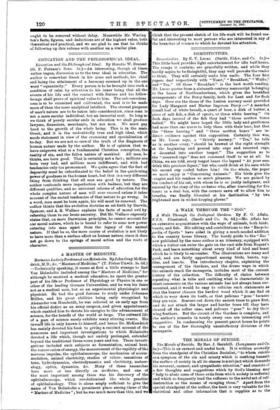EDUCATION AND THE PHILOSOPHICAL IDEAL.
Education and the Philosophical Ideal. By Horatio W. Dresser. (G. P. Putaam's Sons. 5s.)—An interesting, though at times Education and the Philosophical Ideal. By Horatio W. Dresser. (G. P. Putaam's Sons. 5s.)—An interesting, though at times
rather vague, discussion as to the true ideal in education. The author is somewhat Greek in his aims and methods, his chief end being the attainment of a harmony summed up in the one
word "equanimity." Every person is to be brought into such a condition of calm by attention to his inner being that all the events of his life and the contact with Nature and his fellow- beings shall prove of spiritual value to him. The sub-conscious oess is to be examined and cultivated, the soul is to be made more of than the mere analytical intellect. The eternal purposes of man's nature are to be taken into consideration, since man is not a mere secular individual, but an immortal soul. So long as we think of purely secular ends in education we shall produce lawyers, financiers, merchants, but not men. We must pay heed to the growth of the whole being. This is in the main Greek, and it is the undoubtedly true and high ideal, which needs statement in view of the cramming and specialisation of to-day. But we are not so sure of the truth of the diagnosis of human nature made by the author. He is of opinion that we have outgrown what is a fundamental Christian conception, the reality of sin, and the fallen nature of mankind. All men, he thinks, are born good. That is certainly not a fact ; millions are born very bad, and millions more indifferent, and with bad tendencies only too pronounced. We quite agree that the fact of depravity must be subordinated to the belief in the quickening power of goodness in the human heart, but that is a very different thing from thinking that all men are good by nature. The author confounds mere imperfection with badness, but they are different qualities, and no universal scheme of education for the whole complex nature of man will ever succeed unless it takes account of the rooted tendencies of that nature to go wrong. In a word, man must be born again, his will must be renewed. The author thinks that the evolution doctrine as set forth by Darwin, Spencer, and A. R. Wallace explains the facts of moral evil by referring them to our brute ancestry. But Mr. Wallace expressly states that, on mere Darwinian principles, he cannot account for our moral nature, which he is bound to refer to some new power entering into man apart from the legacy of the animal nature. If that be so, the mere course of evolution is not likely to have more than a surface effect on human nature, since it does not go down to the springs of moral action and the roots of character.


















































 Previous page
Previous page